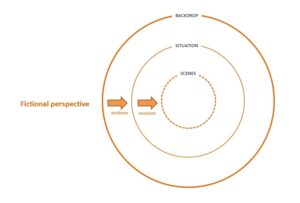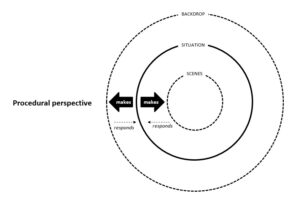I’ve for a while now been on a quest to learn how to run games for the people I enjoy playing with, starting with Dialect, trying to adapt Golden Sky Stories to what I prefer for play, running Trollbabe and now preparing for a game of Primetime Adventures.
While on this journey I also participated in a couple of the courses Ron offers and that has helped me to better understand how I and different parts of role playing that are generic interact.
I don’t think I’m a natural match for these things, I have problems creating content from scratch – as a player I relay heavily on the others around the table to serve me something that inspires my characterizations. I could never make a story on my own in any medium. Why then do I still learn to do it? Well, I have the rather strong urge to enable those who constantly run games for others like me to be able to be a player once in a while.
I had played most of the games before I contemplated to run them which has helped me a lot.
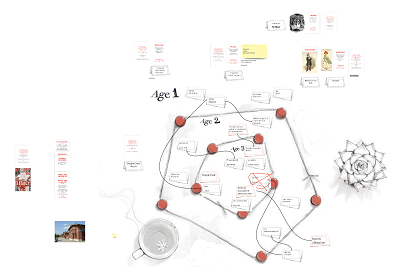
Dialect was relatively easy. The Facilitator in essence makes sure that everybody understands and follows the rules as well as providing the general frame for play as outlined in the book. It also provides a number of questions, answering them the group is able to flesh out some basic things about the specific details of the situation that our characters find themselves in. We played online and had a virtual whiteboard as a table and while I think this game would benefit greatly from being played at a real table playing it online was entirely possible. The thing that I in hindsight think I could have done better? Helping players to jump into scenes instead of “staying in the doorway and wonder if it’s okay to come in now”. In a couple of cases descriptions of circumstances and environment continued for much longer than necessary or healthy for play because players didn’t seem to know how to get into playing.
Golden Sky Stories looked really nice and sweet on paper. The text assumes that the Narrator provides a story and guides the players through it. I should have realized that and even that the mechanics provided need that rigid framework or will not work at all. I did not, so for a couple of months I enjoyed building my own backdrop and setting strongly based on childhood memories. I’m still rather fond of it and I’m sure that the fact that I spend so much time with it helped me when we finally tried playing the game. The player characters everybody came up with were really inspiring and fun to encounter too. My lack of experience still hindered me in trying to run the game. While I think I managed to provide scene openings and opportunities for the characters to interact with I wasn’t able to provide a sense of direction for any of us. In the end I decided not to continue the game after our first session. I think the game is playable and enjoyable with the right kind of Narrator, but that is a person with a different skill set and different ambitions from mine.
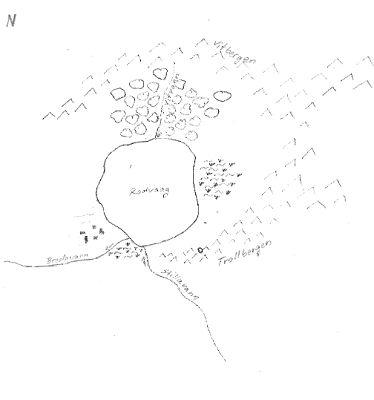
Trollbabe was the first game I did try to run at a real table. I found myself a couple of people from the Spelens Hus group (which has grown considerably since the end of last summer) willing to help me give running a game another try. I had a rough time as play got interrupted by life intervening a couple of times, resulting in sessions that had to be cancelled and me getting more and more nervous for no good reason. The group was fantastically supportive of me and with their help I managed to work through my anxiety and continue play with them. The game itself was a good experience all along. I still needed a lot of time to come up with details of the locations – and I was lucky to have two of the players in essence choosing the same place. I found myself lots of inspiring pictures that I continuously shared with the other players and build my world around them. Coming up with stakes that I deemed to have the right amount of impact was a little difficult but in the end I settled for “good enough”. I did struggle with keeping tabs on all my characters as they lived their lives. It wasn’t entirely clear to me how to get them interact with the Trollbabes in a “natural” way at all times, there is a lot of potential for improvement there. Everybody seemed to enjoy themselves though and now I have a game that the players want to continue with. We properly set up for a new adventure, the players decided to raise the scale for the next adventure (so it will be on the “small group”/family scale), two of them basically switched places (guess that means that I did a good job with the environment), the third Trollbabe decided to wander of to new pastures. I do enjoy the thought of continued play but I want to develop my skills a little more before coming back to this game. Especially the ability to bring my characters agendas into play in a better way. I also realized that a good game text that is easy to read and comprehend not necessarily means a game suitable for a beginner like me (though it may well be for somebody unlike me).
Primetime Adventures is my newest attempt at running a game. I’m going to try to remember all I’ve learned so far about myself and what I need to enjoy being in the drivers seat, having patience with me, trust in my fellow players and taking things in my own pace. I’m at this point certain I will continue my journey and with increasing experience more and more at ease. So far we have met twice and a preliminary realization is that things actually get a little bit easier for every time you try them.

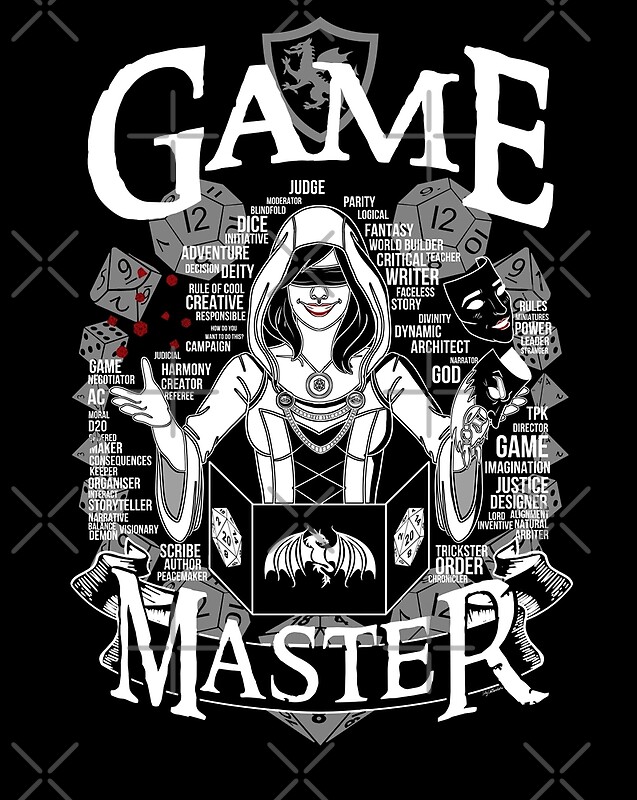
5 responses to “Running a game or running away”
Helma, I always appreciate you as a player and I love how thoughtful you are in the approach to GMing as well. I assume your choice of games is governed by your play experience, but I am curious if there are others outside of your own experience that you have an interest in taking on the GM role for?
So far one of the games I tried was a game I had not played before (Golden Sky Stories), and that didn’t go so well.
I have some ideas about why and those have to do with how I learn and process information as well as the games assumptions about the GM role. I do try to find games that fit me as good as I can. So far most games I’ve considered playing in any capacity have been promoted by someone who liked them with their own words and excitement being what got me interested. Text on a web shop homepage or the back of a book don’t do that for me, they are full of buzzwords that to me are more of a signal to “keep away” than “come and dance”.
Side note, and this is something all of you experienced role players know, if you run a game and people like it they want you to run the same one again or a different group asks you to run the same game if you make enough of a case for it. What I would consider when I’m a little more experienced is to run a game somebody else brings that they want to be a player in for some reason. But I would make sure to engage them to help me with interpreting the text and understanding the rules.
Good for you for not running away!
I see two general skills highlighted in your post: 1) creating elements of situation, and 2) awareness of when a change of situation will be engaging for the yourself and the group.
1) In most games with a “GM” creating and inserting elements of situation usually falls to the GM. While I enjoy creating worlds with all sorts of conflicting factions and strange places, I’ve learned that less is a good idea. I’ve been disappointed when players weren’t interested in the conflicts I thought were most interesting.
This is why games that have a process where the players create some starting interests or drives for their characters works well for me. Games like Sorcerer and Champions provide material that players are interested in and I can take those and create with them. It sounds as if Legendary Lives random character situation generation also provides this kind of material.
A game like Primetime Adventures has the group create the framework of the series concept, along with character issues, connections, edges, and personal sets. These are all elements I find I can build on to prepare situation material. So far with PTA I have found I have some difficulty as Producer bringing in elements that highlight character issues. But as I think about it, I think this is also partly player responsibility and a skill that players have to develop as much as the Producer.
And that leads to
2) Awareness of when a change of situation will be engaging for the yourself and the group. Again a lot of games give the GM a lot of tools for doing this, but good play also requires players to develop that skill. This skill actually has several elements.
First, a sensitivity to what I will call the dramatic tension. This is combination of “are the players acting as if they’re interested and engaged?” and “does the current situation (maybe call it current scene) still have some kind of tension or potential conflict?” Being in tune with these helps make decisions about bringing some element to the attention of a player who might find it engaging, bringing in a planned event or arrival of an NPC, or just when to end the scene.
Neither of these skills is all the responsibility of one person: players can bring the game more alive if they are also aware of these things and ready to suggest or ask for them. (This is sometimes explicitly part of the textual rules — Eg PTA invites players to request the elements of a scene.)
Remember too that when you are the “GM” you are also a player and there to have fun too. What interests you is an important part of that.
Let’s begin at the end: My motivation for running games is to provide those who predominately run games for others with the chance to be a player. If we just for this purpose keep that otherwise unhelpful convention to separate GM-person from player-person.But … I don’t see myself as responsible for their “fun”. If I should find that I don’t have fun (as in the Golden Sky Stories game mentioned above) I have no problems to cancel play. More important, I wouldn’t be able to provide others with inspiration if I don’t feel inspired myself, that actually is independed of what my agency/responsibility is in a given game. So don’t you worry.
You concentrate your comment around situation and that is probably wise, but for my own purpose I’d like to look at the whole picture, meaning the concentric diagram Ron introduced some time around August 2021, as that is a view of the elements that have to be in place to enable play that for me is easiest to comprehend and also resembling how I handle these things.
From the start (Dialect) I realized that I need a really good grasp on the backdrop of what we are going to play. This is independent from the extent of input from the others around the table. That extent varies for the games I did attempt to run so far, from none in Golden Sky Stories over where is your Trollbabe walking at the start of play over input from everybody mainly guided by questions in Dialect to Primetime Adventures which is encouraging group input at the start (which is fine with me) and at every turn (which I do have an opinion about).
Preparation before play starts for me means creating a backdrop and internalizing it to the point where I do no longer have to think about it and the flow of information from it into situations and from there into scenes happens intuitively. I do expect that only a small percentage of what I come up with will ever make it into play, it is mainly there to make me comfortable. So I need rather more than less, on the other hand it doesn’t matter for me what does or does not come into play.
For Primetime Adventures the series concept does give the starting point for the backdrop, the Pilot episode may give corrections.
Let’s look into how information moves back and forth in Primetime Adventures as an example (how I understand it so far) but let’s keep in mind that most I will say about movement of information is true for other games too, the responsibility part is what might be differently distributed. In Primetime Adventures the Producer always starts by describing the situation as it presents at the beginning of an Episode (in our specific play we decided that it will be so at the start of each session). That gives me as the Producer the possibility to draw from anything I know about the backdrop, including what has become part of it through playing scenes up to this point, to describe the situation as it is right now. I for example can decide how much time has passed since the last Episode and/or give glimpses into what has happened “in between”. The latter is something I simply have decided will be part of the opening credits for our specific show. I am conscious of the fact that my presentation of situation and first scene opening may influence what other scenes will be requested during the session. Scenes progress from there. In essence it doesn’t matter who is requesting the scenes. The fact that the producer always is the person who starts scenes makes sure that backdrop information can become situation and come into play.
How play develops from Episode to Episode and what kind of content will be pulled into the situation is guided by the protagonists screen presence and by what has happened so far. During sessions elements of backdrop, situation and scenes (like the outcome of conflicts) move back and forth between them. After the session I go home with a changed backdrop and new situational information which I will draw from to build the necessary framework for starting the next session/Episode.
In my eyes the characters issues, connections, edges and personal sets are part of situations and playing scenes, to different extent, depending on how play develops. It is everybody’s responsibilities to keep them in mind and bring them into play. This can be through scene requests or in playing ones protagonist or in case of the producer the supporting cast. The rules are clear about how everybody is supposed to handle screen presence. The GM advice does muddy the waters but I think if you ignore it things will be fine. Bringing issues into play will happen naturally as far as I can see right now, no need to drag them in. They may not drive a conflict, but the outcome of a conflict will certainly influence them.
I’m really not certain I get your 2nd point, I never much thought about when to end a scene, they seem to come to an end naturally?
Adding images for Helma’s comment:
